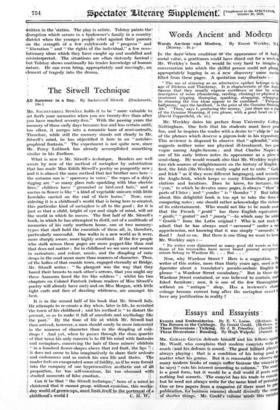The Sitwell Technique
MR. SADHEVEEELL Srrwii.r. holds it to be " more valuable to set forth your memories when you are twenty-five than after You have reached seventy-five." With the passing years the Memory of those early days becomes less and less certain until, too often, it merges into a romantic haze of semi-untruth. Therefore, while still the memory stands out clearly in Mt. Sitwell's mind, he has objectified it here in an " autobio- graphical fantasia." The experiment is not quite new, since Mr. Percy Lubbock has already accomplished something similar in his Earlham.
What is new is Mr. Sitwell's technique. Readers are well aware by now of the method of metaphor by substitution that has made Miss Edith Sitwell's poetry so pungently new ; and it is almost the same method that her brother uses here-4- the autumn sun is " sparrowy in voice," the ropes of a ship'S rigging are " so many glass rods sparkling with blue electric fires," children have " groundsel or bird-seed hair," and a cactus in flower is like " a kind of vegetable unicorn with little howdahs carried on the end of their horns." Now, con' iidering it is a childhood's world that is being here re-created, this particUlar kind of metaphor is all to the good ; for it is just so that a child, bright of eye and single of mind, will see !the world in which he moves. The first half of Mr. Sitwell's • hook, in which he has attempted to distil, out of a multitude of 'memories of his early northern home, one or two memory- :types that shall hold the 'essentials of them all, is, therefore, :particularly successful. One walks in a new world as it were, more sharply aware, more highly sensitized. If the few people ;who stalk across these pages are more puppet-like than real that does not matter ; for in childhood we see men and women -in caricature, and colour, music, and the dimpling of rain- drops in the mud mean more than nuances of character. Thus, 'of the ladies of that seaside town, engaged eternally at Bridge, Mr. Sitwell writes : " So plangent was the way that they bared their breasts to each other's arrows, that you might say these Amazons faced the fire like soldiers "-; whilst his two chapters on Colonel Fantock (whom readers of Miss Sitwell's poetry will already have met) and. on Miss Morgan, with little tight curls and face of dazzling whiteness, are amongst his best.
It is in the second half of 'his book that Mr. Sitwell fails. IIe attempts to re-create a day when, later in life, he revisited the town of his childhood ; and his method is " to distort the present, so as to make it full of anecdote and mythology like ' the past." By the time of life at which Mi. Sitwell had then arrived, however, a man should surely be more interested in the nuances of character than in the dimpling of rain- : drops ? And yet, when he passes through_the slum quarter of that town his only Concern is to fill his mind with fantasies and metaphors, conceiving the hair of those miners' children • " in a hundred flower-shapes above that red fruit, the lips ; I it does not occur to him imaginatively to share their ardours and endurances and so enrich his own life and theirs. The reader feels an exasperated sense of futility, as if he were forced t into the company of one hypersensitive aesthetic out of all 1 proportion; far too - self-conscious, far too obsessed with 2 studied moments of false emotion..
Can it be-that " the Sitwell technique," born of a mind so cloistered that it cannot grasp, withouteynicism, this works' - day .world,otgrow-APst.inl.14.1.41tAsglf to the portrayal of a


























































 Previous page
Previous page